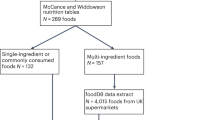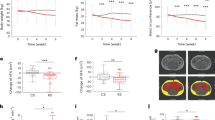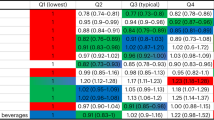Abstract
OBJECTIVE: To assess the ability of a meat free diet to support normal growth of children.
DESIGN: A one year longitudinal observational case—comparison study of growth.
SETTING: Children were recruited mainly through schools from Merseyside and all measurements were taken in their homes.
SUBJECTS: Fifty ‘free-living’ children following meat free diets, aged 7–11 y (expected to be pre-pubertal), were compared with a control group of 50 omnivores matched for age, sex and ethnic group.
INTERVENTION: None.
MAIN OUTCOME MEASURES: Height, weight, upper arm skinfold thicknesses and mid-upper arm circumference measurements were taken at baseline and one year later. The increments over one year were each analysed using a multiple stepwise regression model which derived predicted increments controlled for a variety of factors other than the diet factor.
RESULTS: Of all the anthropometric measurements examined only the predicted height increment of the vegetarians was slightly greater than that of the omnivores (difference in predicted height increment=0.47 cm, P=0.05). This difference was only apparent after allowing for father’s height, maternal smoking habit and number of siblings. A tendency for the vegetarians to be leaner than the omnivores was not significant at the 5% level and both the vegetarian and omnivorous groups lay close to the 50th percentiles for both height and weight (Child Growth Foundation, 1994).
CONCLUSIONS: The results suggest that these children who followed a meat free diet and conventional lifestyles grew at least as well as children who ate meat.
SPONSORSHIP: This project was supported by the Vegetarian Society of the United Kingdom and Liverpool John Moores University.
This is a preview of subscription content, access via your institution
Access options
Subscribe to this journal
Receive 12 print issues and online access
$259.00 per year
only $21.58 per issue
Buy this article
- Purchase on Springer Link
- Instant access to full article PDF
Prices may be subject to local taxes which are calculated during checkout
Similar content being viewed by others
Author information
Authors and Affiliations
Rights and permissions
About this article
Cite this article
Nathan, I., Hackett, A. & Kirby, S. A longitudinal study of the growth of matched pairs of vegetarian and omnivorous children, aged 7–11 years, in the North-West of England. Eur J Clin Nutr 51, 20–25 (1997). https://doi.org/10.1038/sj.ejcn.1600354
Received:
Revised:
Accepted:
Issue Date:
DOI: https://doi.org/10.1038/sj.ejcn.1600354
Keywords
This article is cited by
-
Intake of micronutrients and fatty acids of vegetarian, vegan, and omnivorous children (1–3 years) in Germany (VeChi Diet Study)
European Journal of Nutrition (2022)
-
Mineral Composition of Bread Wheat Cultivars as Influenced by Different Fertilizer Sources and Weed Management Practices
Gesunde Pflanzen (2022)
-
Progress and Prospect of Essential Mineral Nanoparticles in Poultry Nutrition and Feeding—a Review
Biological Trace Element Research (2020)
-
Vegetarian diets in childhood and adolescence
Molecular and Cellular Pediatrics (2019)
-
Vegetarische Kostformen im Kindes- und Jugendalter
Monatsschrift Kinderheilkunde (2018)



